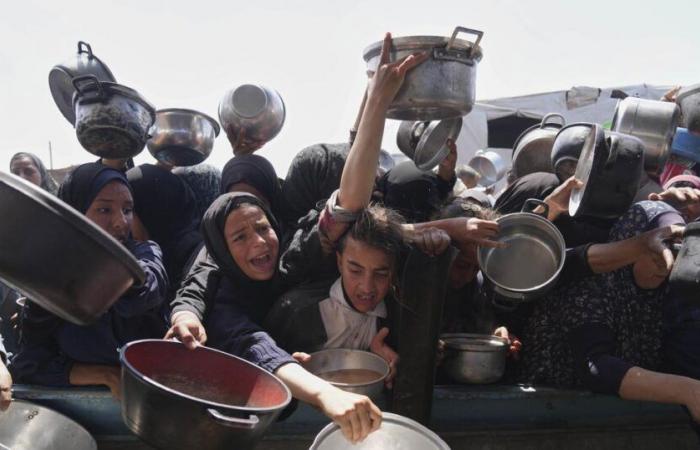Deprived of everything, the Gaza Strip is dying under the Israeli blockade. Two Swiss caregivers returned from “Hell”, Sonam Dreyer Cornut, doctors without borders, and Hicham El Ghaoui, general practitioner and emergencyist, testify to the microphone of a territory in agony, where healing has become impossible.
For two months, the Gaza Strip has been subject to a total blockade imposed by the Israeli army. No more food, water or medical equipment truck crosses the borders of the Palestinian enclave.
A humanitarian situation that the UN agencies and NGOs consider dramatic and which could be further pushed by the expansion of the offensive in Gaza wanted by Israel, including a plan of “conquest” of the territory of the band and the displacement of a majority of its population.
>> Read also: A plan including the “conquest” of Gaza and the displacement of its approved population in Israel
Guests in Forum, Sonam Dreyer Cornut, head of the medical team of doctors without borders in Gaza, and Hicham El Ghaoui, general practitioner and emergencyist in Bagnes (VS), deliver testimonies imbued with anger, pain and resignation. Both say they are “frustrated” and “destroyed”.
Anything that normally keeps life, not to survive, but simply to live, gradually disappears

“In recent weeks have been particularly hard,” says Sonam Dreyer Cornut. Arrived at the end of February, she attended the total closure of the territory, then resumption of fighting. “This chain of events made the situation more critical week after week.”
On the ground, it describes the collapse of all essential infrastructure: more fuel, power cuts, food and medical shortages. “Everything that normally allows life, not to survive, but simply to live, disappears gradually. Today, even the most basic needs to treat patients and support the population are no longer assured.”
Hospitals are overwhelmed, damaged or out of service. “Last week, in the north of Gaza, we were only eight health centers to ensure ambulatory and internal medicine consultations, and only a few hospitals could still do surgery or accommodate patients in operating room.”
A feeling of generalized insecurity
The feeling of insecurity has become widespread. Even hospitals, once considered refuges, are no longer perceived as safe places. “Today, in Gaza, no one knows where to go. No place is sure.”
Hicham El Ghaoui, on the other hand, has carried out three humanitarian missions in Gaza in recent months. But the doctor established in Valais has given up on again. “Honestly, I no longer really believe in medical missions. I do not know a single doctor who came from Gaza without being deeply frustrated or annihilated.”
When you start to hope that a patient dies quickly, because you know that by surviving, he will suffer for weeks without adapted care, it is that there is a problem. The system collapsed.

Despite their essential character, these missions sometimes run at the admission of helplessness. “When the Israeli army prevents you from sending antibiotics, anesthetics or essential material, what is the meaning of our presence?” He questions, evoking a real “hell”.
His testimony is chilling: “Cutting the leg of a little girl without anesthetic, giving up treating a burned person because there is no morphine, not being able to relieve pain … It is immense violence.” And to add: “When you start to hope that a patient dies quickly, because you know that by surviving, he will suffer for weeks without adapted care, is that there is a problem. The system collapsed.”
Citizen mobilization
Sonam Dreyer cornut shares the frustration of his colleague, but also underlines the importance of solidarity, even minimal: “Before my departure, a colleague told me that even if we have fewer means, even if we have nothing, the simple fact that we are there, that we choose to be here despite everything, that gives them hope. Our presence, even symbolic, counts for them.”
Faced with the humanitarian impasse, Hicham El Ghaoui chose another path: the civic way. For him, the world must wake up. He therefore launched the initiative of a peaceful march. “From Rafah, in Egypt, to the gates of Gaza. We are now 33 countries to participate, with thousands of people. I invite each indignant citizen to join us.”
This non -violent initiative, scheduled for June 15 at the start of Cairo, aims to “make a human voice heard”. And perhaps, finally, to awaken consciences.
Interview by Mehmet Gultas
Web text: Fabien Grenon










